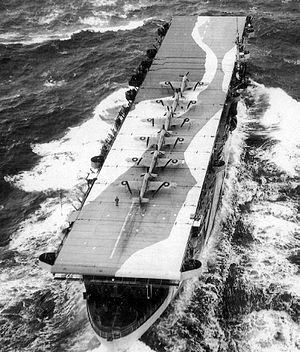36°15′N 07°45′W / 36.250°N 7.750°W
 HMS Avenger with Sea Hurricanes on deck
| |
| History | |
|---|---|
| Name | Avenger |
| Ordered | C3-P&C |
| Builder | Sun Shipbuilding |
| Laid down | 28 November 1939 |
| Launched | 27 November 1940 |
| Commissioned | 2 March 1942 |
| In service | 1942 |
| Homeport | HMNB Clyde |
| Fate | Sunk by U-155 off Gibraltar on 15 November 1942 |
| General characteristics | |
| Class and type | Avenger-class escort carrier |
| Displacement |
|
| Length | 492.25 ft (150.04 m) |
| Beam | 66.25 ft (20.19 m) |
| Height | 23.25 ft (7.09 m) |
| Propulsion | 1 shaft, 4 diesel engines giving 8,500 bhp (6,300 kW) |
| Speed | 16.5 knots (30.6 km/h; 19.0 mph) |
| Complement | 555 |
| Armament |
|
| Aircraft carried |
|
| Aviation facilities |
|
HMS Avenger was a Royal Navy escort aircraft carrier during the Second World War. In 1939 she was laid down as the merchant ship Rio-Hudson at the Sun Shipbuilding & Drydock Company yard in Chester, Pennsylvania. Launched on 27 November 1940, she was converted to an escort carrier and transferred under the lend lease agreement to the Royal Navy. She was commissioned on 2 March 1942.
Avenger's capacity allowed for a maximum of 15 aircraft. In September 1942, she took part in what was the largest and most successful Russian convoy to date. Upon her return home, after observing a number of design faults, Avenger's captain drew up recommendations for future escort carrier design. In November 1942 she took part in Operation Torch, the Allied invasion of North Africa, where she suffered engine problems. While leaving North Africa to start the journey home Avenger was sunk by the German submarine U-155 on 15 November 1942 at 3:20am GMT, 9 hours after leaving Gibraltar for Britain, with a heavy loss of life among her crew.